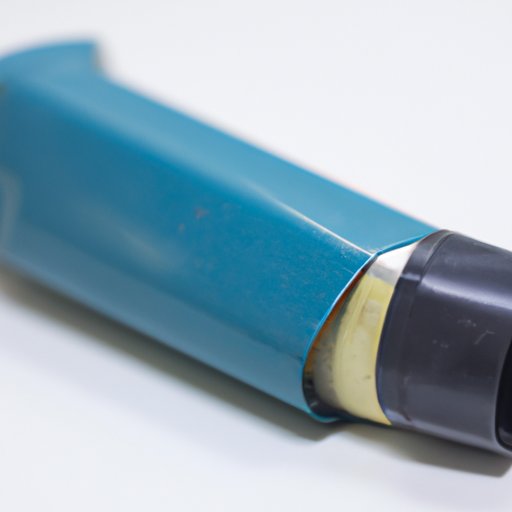
I. Introduction
If you rely on an inhaler to manage your asthma or COPD, you understand how important it is to have one on hand when you need it. But what happens when your inhaler reaches its expiration date? Can you still use it, or should you dispose of it and get a new one? In this article, we’ll explore the risks and benefits of using an expired inhaler.
II. Don’t risk it: The dangers of using an expired inhaler
Using an expired inhaler can be dangerous. The inhaler may not work as well as it should, which could lead to difficulty breathing and worsening symptoms. In some cases, using an expired inhaler could even be life-threatening.
Other potential side effects of using an expired inhaler include:
- Increased risk of infection
- Worsening of symptoms
- Less effective medication delivery
It’s important to note that these side effects can vary depending on the type of inhaler you’re using.
Ignoring expiration dates on medications is never a good idea. Doing so can lead to serious health consequences. With inhalers, expiration dates are especially important, as the medication inside can degrade over time and become less effective.
III. Expired inhalers: To use or not to use?
When it comes to expired medications, the general rule is that it’s better to be safe than sorry. However, there are some cases where using an expired inhaler may be acceptable.
The main difference between expiration and effectiveness is that expiration dates indicate when the medication is no longer guaranteed to work as intended. That doesn’t mean it becomes ineffective the very next day; in fact, it may still be effective for some time after the expiration date.
If you’re in a situation where you need to use an expired inhaler and you don’t have a replacement, it may still be worth using it. However, it’s essential to monitor your symptoms closely and seek medical attention if they worsen.
IV. What’s the shelf life of your inhaler? Here’s what you need to know
The shelf life of an inhaler depends on the type of inhaler you’re using, as well as storage conditions. The expiration date is usually printed on the packaging and can range from one to two years from the date of manufacture.
Factors that can affect the effectiveness of your inhaler include exposure to heat, humidity, and light. It’s essential to store your inhaler in a cool, dry place, away from direct sunlight and temperature extremes. Additionally, don’t store your inhaler in the bathroom, as the humidity can cause the medication to degrade more quickly.
V. Exploring the effectiveness of expired inhalers
Science tells us that expired inhalers may not be as effective as unexpired ones. Over time, the medication inside can degrade, and this degradation can lead to less effective treatment for your asthma or COPD symptoms.
However, there are instances where expired inhalers may still be effective. If an inhaler has been stored correctly, its medication may still be potent beyond the expiration date. However, it’s challenging to determine whether an expired inhaler is still effective without consulting a doctor or pharmacist.
VI. When to replace your inhaler: A guide to expiration dates
In general, it’s a good idea to replace your inhaler before it reaches its expiration date. This ensures that the medication inside is as effective as possible when you need it most.
If your inhaler has passed its expiration date, it’s generally recommended that you dispose of it and get a new one. Some inhalers may still be effective beyond their expiration date, but it’s challenging to determine when this is the case. As we’ve mentioned, the medication inside can degrade over time, leading to less effective symptom relief.
Warning signs that your inhaler may be expired include:
- Less effective symptom relief
- Discoloration or cloudiness in the medication container
- An odd or unpleasant smell
- An expiration date that has passed
VII. The importance of proper inhaler maintenance and storage to avoid expiration
Proper inhaler maintenance and storage are crucial to ensure that your inhaler is effective when you need it. Here are some best practices for storing inhalers:
- Store your inhaler in a cool, dry place
- Avoid exposing your inhaler to direct sunlight or temperature extremes
- Keep the inhaler away from humidity, such as in the bathroom
- Regularly clean the inhaler according to the manufacturer’s instructions
It’s also important to use your inhaler correctly to ensure that you’re getting the full dose of medication you need. If you’re unsure about how to use your inhaler correctly, consult your doctor or pharmacist for guidance.
VIII. Conclusion
Using an expired inhaler can be dangerous, so it’s generally recommended to dispose of it and get a new one before the expiration date. While there are cases where an expired inhaler may still be effective, it’s difficult to determine whether this is the case without consulting a healthcare professional.
Proper inhaler maintenance and storage are also essential to ensure that your inhaler stays effective for as long as possible. By following best practices and keeping an eye on expiration dates, you can ensure that your inhaler is there for you when you need it most.




